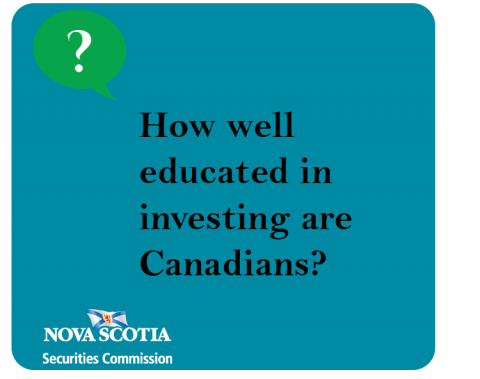Submitted by nsscadmin on

We’d love to say that all Canadians have a strong knowledge of investing and finances, but according to our most recent Investor Index Survey that most likely isn’t the case.
The Canadian Securities Administrators (CSA) conducted their most recent Investor Index Survey earlier this year. Similar surveys have also been conducted in previous years, including 2009 and 2012, which can be found on the CSA website.
The 2017 Investor Index survey was conducted by Innovative Research Group Inc. They surveyed 7,271 Canadians 18 years or older between August 28th-October 2nd to develop an in-depth profile of Canadians and their investment behaviour and knowledge. Included in the survey were 234 respondents from Nova Scotia.
As part of the survey seven knowledge questions were put to all respondents to create the Investment Knowledge Index. Of these seven questions, three were standardized questions used in similar international studies and related to the concepts of simple compound interest, real compound interest and investment risk. The other four questions related to diversification, mutual fund returns, warning signs of fraud, and the relationship between interest rates and bonds.
So, how did Canadians do? If this were a true test and you needed at least 50 per cent to pass, or at least four correct, then just over half of the survey respondents would be in trouble. From the respondents 51 per cent got from 0-3 questions correct, 33 per cent got 4-5 correct and only 16 per cent got 6-7 correct.
According to the data that was obtained in the survey the older the respondents were the better they tended to do on the questions. From the 65 and older range 25 per cent got 6-7 questions right and only 39 per cent failed. For respondents between the ages of 18-24, 67 per cent got 0-3 questions and only 6 per cent got 6-7 questions right. Respondents with more investment experience and higher incomes also did better than those with little investing experience and lower incomes.
Now that you know how well, or in most circumstances how poorly most Canadians did on the questions how do you think you would fare? Let’s find out:
1. Suppose you had $100 in a savings account and the interest rate was 2% per year. After 5 years, how much do you think you would have in the account if you left the money to grow?
A: More than $102
B: Exactly $102
C: Less thank $102
2. Imagine that the interest rate on your savings account was 1% per year and inflation was 2% per year. After 1 year, how much would you be able to buy with the money in this account?
A: More than today
B: Exactly the same
C: Less than today
3. Buying a single company’s stock usually provides a safer return than a stock mutual fund.
A: True
B: False
4. When an investor diversifies his or her investments, the risk of losing money increases.
A: True
B: False
5. Mutual funds pay a guaranteed rate of return.
A: True
B: False
6. Investments that offer a higher-than-market rate of return and little to no risk are almost always fraudulent.
A: True
B: False
7. Bond prices go up when interest rates go down.
A: True
B: False
Answers:
1. A
2. C
3. B
4. B
5. B
6. A
7. A
So, how did you do? Did you do better than most Canadians or do you also need help with your investment knowledge? No matter which side of the coin you’re on we hope you’ll continue to read our posts and our shared content to better your investing IQ.
